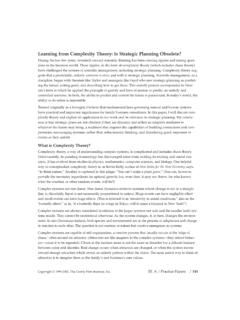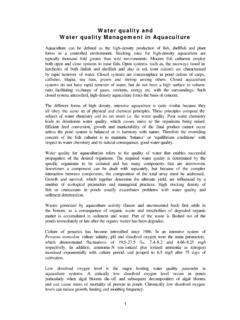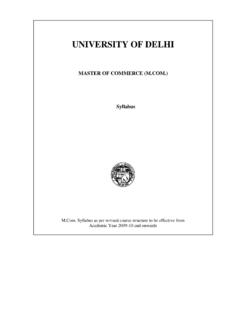Transcription of The globalisation of technology and its implications …
1 The globalisation of technology and its implicationsfor developing countriesWindows of opportunity or further burden?Daniele Archibugia,*, Carlo Pietrobellib,1aCNR, Via dei Taurini, 19, 00185 Rome, ItalybUniversity of Rome III, via Ostiense 161, 00154 Rome, ItalyReceived 21 June 2002; received in revised form 9 December 2002; accepted 9 December 2002 AbstractOn the basis of a categorisation of ways in which the generated knowledge is transmitted, this paperexplores the impact of the different forms of the globalisation of technology on developing travelling, media, scientific and technical workshops, Internet and many other communi-cation channels, globalisation allows the transmission of knowledge at a much greater pace than in thepast. However, this does not automatically imply that developing countries succeed to benefit fromtechnological advances.
2 On the contrary, this will strongly rely on the nature of the technology and ofthe policies implemented in both advanced and developing Elsevier Science Inc. All rights classification:O30; O34; F23 Keywords: technology transfer; Transnational corporations; Technological alliance; Scientific collaborations1. IntroductionThe international transmission of know-how, knowledge and technological expertise isgrowing and it is increasingly important in the world economy[1]. The weight of science-0040-1625/$ see front matterD2003 Elsevier Science Inc. All rights (02)00409-2* Corresponding author. Tel.: + (D. Archibugi), (C. Pietrobelli).1 Tel.: + Forecasting & Social Change70 (2003) 861 883based commodities is constantly increasing in world trade[2], foreign direct investment (FDI)by transnational corporations (TNCs) is an important vehicle for the transmission ofinnovation across the world[3], transborder scientific and technological cooperation isabsorbing more energies and resources of governments and firms[4].
3 New opportunities arenow opening to benefit from the available stock of knowledge. But how important are theyfor less developed countries (LDCs)? Are they participating in these flows or are they ratherstaying aside and observing them? How are their technological capabilities affected by theconsiderable increase in the flows of knowledge?The aim of the paper is to: Define the globalisation of technology with the use of a new categorisation. Report some evidence on the degree of developing countries participation in theglobalisation of technology . Discuss the relevance and impact of the globalisation of technology on developingcountries, and its implication for their development strategies and specific form and extent of technology globalisation for developing countries bearsimportant consequences for their government action, and implies an especially active attitudetowards innovation policies.
4 It will in fact be argued that the globalisation of technologyoffers new opportunities for development, but that they are by no means available withoutdeliberate effort to absorb innovation through endogenous paper is organised as follows. The next section reassesses the concept of technologywhich informs this paper, since we believe that this is particularly important to designappropriate strategies and policies. Section 3 reports a taxonomy on the different forms thatthe globalisation of technology can take; this will help us measure the significance ofglobalisation and assess the various strategies undertaken by governments and firms. Section4 documents to what extent developing countries are taking part in the globalisation oftechnology; although the evidence available is still unsatisfactory, it clearly emerges that thebulk of technological activities is produced in and exchanged among the most advancedcountries.
5 The Section 6 discusses the advantages and the disadvantages of the strategiesavailable to developing countries to bridge their technology gap, and to integrate themselvesamong the more innovative and dynamic Lessons learnt on the nature of technologyEconomists have often studied technology with the tools of analysis of competitivemarkets. Thus, if technology is studied like any other commodity, and if markets were freelyworking and perfect competition prevailed, then no problem of technology transfer wouldpose. technology (from whatever source) would be easily and instantaneously transferred andutilised. The efficiency of its use would only be a matter of ensuring the conditions forefficient resource allocation in the context of exogenously determined technological alter-natives.
6 technology policy would only consist of government sponsorship of institutes thatD. Archibugi, C. Pietrobelli / Technological Forecasting & Social Change 70 (2003) 861 883862collect, process and disseminate technical information, justified as a provision of publicgoods. This theory descends from two assumptions: (i) technology consists simply of a set oftechniques wholly described by their blueprint ; (ii) all techniques are created in thedeveloped countries , from which they flow at no or low costs to developing countries (fora recent reaffirmation of this old belief, seeRef. [5]).However, several authors recognised, already a few decades ago, the special features oftechnology and technological change, leading to a perception of technology in more complexterms (see Nelson[55]).
7 Thus, first of all, no existing technique is completely expressed bythe sum and combination of their material inputs and the codified information about it. In fact,much of the knowledge on how to perform elementary processes and on how to combinethem efficiently is tacit, not easibly embodied, nor codifiable or readily transferable, and afirm will not be able to know with certainty all the things it can do, and certainly will not beable to articulate explicitly how it does what it does (Nelson[6], p. 84).This means that technology is not simply a set of blueprints, or of instructions, that iffollowed exactly will always produce the same outcome. Although two producers in the samecircumstances may use identical material inputs with equal information available, they maynonetheless employ two really distinct techniques due to their different understanding of thetacit elements.
8 Thus, techniques are sensitive to specific physical as well social circumstances(Evenson and Westphal[7], p. 2212).Moreover, technology is not instantaneously and costlessly accessible to any firm: a firmdoes not simply select the preferred option from the freely available international technologyshelf, as there may be obstacles and difficulties in obtaining the desired technology . Simplychoosing and acquiring a technique does not imply operating it efficiently ( at best practice ).Individual firms do not have a complete knowledge of all the possible technologicalalternatives, their implications and the skills and information they require. The individualfirm does not know the entire production curve, illustrating an infinite number of alternatives,as neo-classical theory assumes.
9 To the extent technologies are tacit, firm production sets arefuzzy around the edges (Nelson[6], p. 84).Understanding technology in these more complex and realistic terms implies that tangibleand intangible investments in technology are required whenever technology is newly applies to domestic as well as foreign imported technologies. Each firm has to exertconsiderable absorptive efforts to learn the tacit elements of technology and gain adequatemastery. This is at the opposite extreme from the neo-classical premise that technology , aswell as productive inputs and outputs, is perfectly known. This knowledge is not instanta-neously and costlessly available to all firms, and technology transfer poses substantialproblems of adaptation and absorption that are related to investments in technologicalcapability, the complex array of skills, technological knowledge, organisational structures,required to operate a technology efficiently and accomplish any process of dynamic technological effort implies a process of learning that is qualitatively2 References on the theory of technological capabilities include Bell and Pavitt[51], Enos[9], Fransman andKing[52], Katz[12], Lall[13]and Pack and Westphal[53].
10 D. Archibugi, C. Pietrobelli / Technological Forecasting & Social Change 70 (2003) 861 883863different from the traditional learning by doing , as it involves an active attitude. Learningmay be pursued in a variety of ways[8]and the passive learning from operating is only powerful way of learning is by training within producing firms. This has thedisadvantage that training will probably stay at a level below what would be socially optimal,because of the well-known problem of incomplete appropriability of its results, but in-firmtraining will be more appropriate as the firm will provide exactly the kind and quantity oftraining necessary for the absorption and advancement of technology (Enos[9], p. 80).Furthermore, learning itself has to be learnt, as it is a highly specialised process, that involvesthe organisation of the accumulation of technical knowledge[10].






